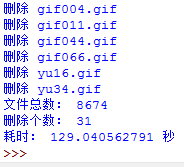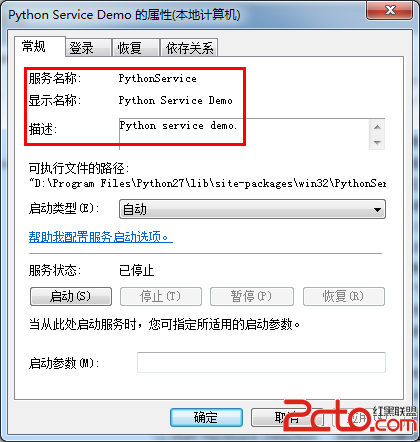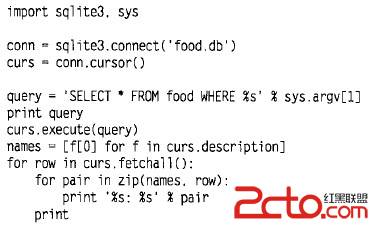Python MySQLdb模块
[Python]代码
view source print ? 01 #-*- encoding: gb2312 -*-
02 import os, sys, string
03 import MySQLdb
04
05 # 连接数据库
06 try:
07 conn = MySQLdb.connect(host='localhost',user='root',passwd='xxxx',db='test1')
08 except Exception, e:
09 print e
10 sys.exit()
11
12 # 获取cursor对象来进行操作
13
14 cursor = conn.cursor()
15 # 创建表
16 sql = "create table if not exists test1(name varchar(128) primary key, age int(4))"
17 cursor.execute(sql)
18 # 插入数据
19 sql = "insert into test1(name, age) values ('%s', %d)" % ("zhaowei", 23)
20 try:
21 cursor.execute(sql)
22 except Exception, e:
23 print e
24
25 sql = "insert into test1(name, age) values ('%s', %d)" % ("张三", 21)
26 try:
27 cursor.execute(sql)
28 except Exception, e:
29 print e
30 # 插入多条
31
32 sql = "insert into test1(name, age) values (%s, %s)"
33 val = (("李四", 24), ("王五", 25), ("洪六", 26))
34 try:
35 cursor.executemany(sql, val)
36 except Exception, e:
37 print e
38
39 #查询出数据
40 sql = "select * from test1"
41 cursor.execute(sql)
42 alldata = cursor.fetchall()
43 # 如果有数据返回,就循环输出, alldata是有个二维的列表
44 if alldata:
45 for rec in alldata:
46 print rec[0], rec[1]
47
48
49 cursor.close()
50
51 conn.close()
Python代码
# -*- coding: utf-8 -*-
#mysqldb
import time, MySQLdb
#连接
conn=MySQLdb.connect(host="localhost",user="root",passwd="",db="test",charset="utf8")
cursor = conn.cursor()
#写入
sql = "insert into user(name,created) values(%s,%s)"
param = ("aaa",int(time.time()))
n = cursor.execute(sql,param)
print n
#更新
sql = "update user set name=%s where id=3"
param = ("bbb")
n = cursor.execute(sql,param)
print n
#查询
n = cursor.execute("select * from user")
for row in cursor.fetchall():
for r in row:
print r
#删除
sql = "delete from user where name=%s"
param =("aaa")
n = cursor.execute(sql,param)
print n
cursor.close()
#关闭
conn.close()
基本的使用如上,还是很简单的,进一步使用还没操作,先从网上找点资料放上来,以备后续查看
1.引入MySQLdb库
import MySQLdb
2.和数据库建立连接
conn=MySQLdb.connect(host="localhost",user="root",passwd="sa",db="mytable",charset="utf8")
提供的connect方法用来和数据库建立连接,接收数个参数,返回连接对象.
比较常用的参数包括
host:数据库主机名.默认是用本地主机.
user:数据库登陆名.默认是当前用户.
passwd:数据库登陆的秘密.默认为空.
db:要使用的数据库名.没有默认值.
port:MySQL服务使用的TCP端口.默认是3306.
charset:数据库编码.
更多关于参数的信息可以查这里
http://mysql-python.sourceforge.net/MySQLdb.html
然后,这个连接对象也提供了对事务操作的支持,标准的方法
commit() 提交
rollback() 回滚
3.执行sql语句和接收返回值
cursor=conn.cursor()
n=cursor.execute(sql,param)
首先,我们用使用连接对象获得一个cursor对象,接下来,我们会使用cursor提供的方法来进行工作.这些方法包括两大类:1.执行命令,2.接收返回值
cursor用来执行命令的方法:
callproc(self, procname, args):用来执行存储过程,接收的参数为存储过程名和参数列表,返回值为受影响的行数
execute(self, query, args):执行单条sql语句,接收的参数为sql语句本身和使用的参数列表,返回值为受影响的行数
executemany(self, query, args):执行单条sql语句,但是重复执行参数列表里的参数,返回值为受影响的行数
nextset(self):移动到下一个结果集
cursor用来接收返回值的方法:
fetchall(self):接收全部的返回结果行.
fetchmany(self, size=None):接收size条返回结果行.如果size的值大于返回的结果行的数量,则会返回cursor.arraysize条数
补充:Web开发 , Python ,




